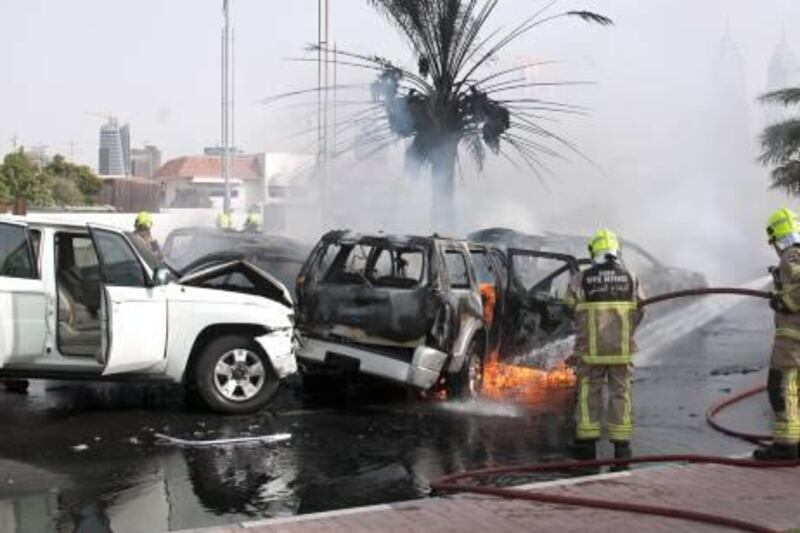DUBAI // Deaths on Dubai's roads peaked in 2007 at 332, but by 2010 had dropped by 54 per cent to 152.
The trend was reversed after a detailed analysis in 2007 that identified the problems, and a new strategy aimed at reducing the death toll, leading police officials said yesterday.
They were presenting a detailed analysis of the emirate's road safety and enforcement measures, showing troubling trends from 1998 to 2007 but improvement thereafter, at the Traffic Scientific Forum organised by Zayed University.
"We conducted a SWOT analysis in 2007 and implemented a strategy to cut road deaths significantly," said Maj Gen Mohammed al Zafien, Director of the Dubai Police General Traffic Administration. SWOT stands for Strength-Weakness-Opportunity-Threat.
The analysis identified the strengths as modern road networks and a high level of human resources. The weaknesses were outdated traffic laws, the lack of awareness of those laws, an overloaded police traffic department and a lack of co-ordination among related departments.
The opportunity presented as a result of the report saw the Dubai Police Traffic Administration reshuffle its policies and financial resources were made available.
"Our strategic aims at Dubai Police are the prevention of crime, quick case resolutions, increasing traffic safety and disaster preparation," said Maj Gen Khamis Mattar al Mezaina, Deputy Dubai Police Chief.
But threats included dangerous driving and speed limits that were too high. The evidence is that between 1998 and 2007 road deaths increased by more than 60 per cent, Maj Gen al Zafien said.
"We moved the licensing department to the Roads and Transport Authority to allow more hands to be available for safety implemetation duties, and changed the policies to allow minor accident reports be filed at police stations instead of patrols, because there is on average a minor accident every three minutes in Dubai," said Maj Gen al Zafien said.
To address manpower issues, "we increased the number of radars to cover all the 4,114 square kilometres of the emirate. We now have one radar for every eight square kilometres," he said. In 2010 there were 535 radar cameras, up from 193 in 2007.
Speed limits were also reduced, with a maximum residential limit of 80kph. In 2007 and 2008, higher traffic fines and the black points system were introduced. Nearly 150 additional violations were codified.
"Traffic fines were raised by 1,000 percent for some violations and we introduced a graded fine system for speeding, where previously it was a standard Dh200 fine.
"Now it starts from Dh600 to Dh1,000 in addition to the vehicle being impounded. We also introduced a Dh200 fine for jaywalking, which helped to reduce pedestrian deaths from 124 in 2007 to 34 in 2010."
The number of fines handed out more than doubled over five years, with 2.3 million in 2010.
"Police presence was also significantly increased in the roads," the Major General said. "We have patrols in front of all schools to prevent any pedestrian deaths there, as well as increased patrols at weekends around areas where violations commonly occur."
Studies identified the most dangerous drivers, who were then made the target of education and enforcement campaigns. Dangerous roads were identified as well, and more resources devoted to them.
"We placed more patrols and safety measures in these roads, reducing deaths significantly," he said.
On Sheikh Zayed Road, for instance, the number of deaths dropped by more than 60 per cent between 2005 and 2010.
He said the police would not grow complacent and have plans to continue reducing road deaths to their goal of a statistical zero by 2020.
"Currently we are targeting minibuses and recreational motorcycles," he said.
amustafa@thenational.ae






